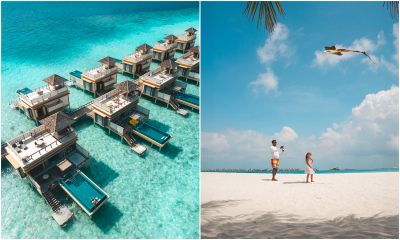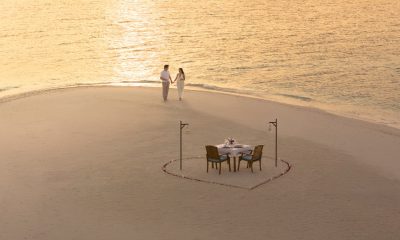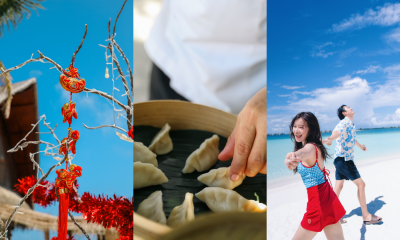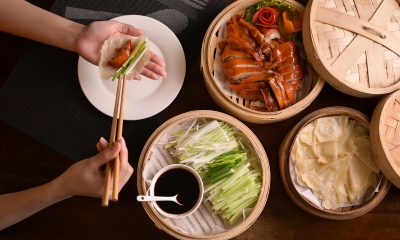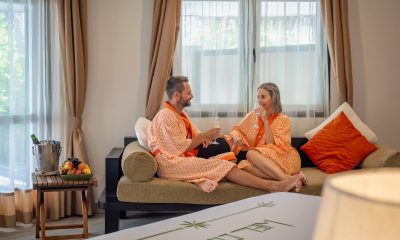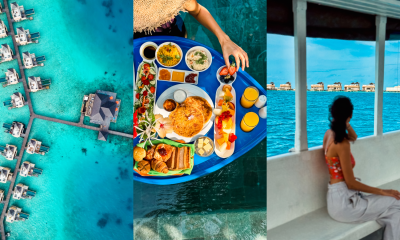Featured
A year on, Banyan Tree’s Maldives resorts lead in achieving plastic elimination pledge

One year ago, on Earth Day 2018, Banyan Tree embarked on a journey to reduce single use plastic to ultimately become plastic free. The hospitality and tourism industry as a whole is a major consumer of this planet’s resources, often providing one-time use products on mass scales. Whilst this presents a unique opportunity to really impact the effects of global plastic consumption, it is by no means a small task.
The challenge involves finding suitable alternatives that are both sustainable and cost-effective, but equally match up to the rigorous health and quality assurances required from the industry. Preventing plastic waste from reaching landfills or polluting the environment is another primary focus. Arguably, the greatest challenge is pioneering this movement, which although growing is still in its infancy. This requires driving action across suppliers and vendors in addition to raising awareness of the need among business stakeholders, which include its own employees, guests and members of the community.

This ambitious target has inspired the change needed to successfully eliminate 4.2 million single-use items over the past year, equating to a 26 per cent reduction in use. This is a positive first-step in the right direction, considering the magnitude of the ultimate plastic-free goal.
Banyan Tree’s properties here in the Maldives have achieved the most significant reductions across the group, with both Banyan Tree Vabbinfaru and Angsana Ihuru in North Male Atoll reducing their total single-use plastic usage by 75 per cent. Angsana Velavaru in Dhaalu atoll, follows with a 32 per cent reduction. Collectively, the three properties have eliminated a quarter of a million single-use plastic items, preventing them from reaching landfill or ending up in the ocean.

In the first year, three of the most common single-use plastic items produced and consumed across the world were targeted for primary elimination: plastic bottles, plastic straws and plastic bags. These are fundamental sources of global plastic pollution. Worldwide, five trillion single-use plastic bags are used each year, nearly 10 million each minute, requiring 600 million barrels of oil to manufacture. Less than one per cent of this amount is recycled, with the rest ending in landfills or polluting our environments. Up to 80 per cent of ocean plastic pollution originates from land.

Given the vast expanses of blue ocean and white sand beaches and lagoons that dominate the seascape of the Maldives, it is easy to overlook the current threat that plastic pollution poses to the health of its island inhabitants and the future of the kaleidoscope of marine life found below the waves. One only needs to walk beside the ferry terminals in Male or join a community cleanup on a locally inhabited islands to experience the difficulty the country is currently facing, with regards to effective waste management. The international non-profit Parley for the Oceans are currently working on the first nationwide plastic recycling program for the Maldives, but generally speaking recycling initiatives are limited, mostly organised on small scales by local schools or councils with limited resources.
 Awareness and understanding of plastic consumption and waste is constantly improving, with growing support of the need to eliminate single-use plastic and switch to sustainable and eco-friendly alternatives. Banyan Tree continues to educate its associates, guests and communities around the areas it operates, about the need to consider the five R’s of responsible consumption – Reduce, Refuse, Reuse, Recycle and Remove. This is achieved by driving events such as community awareness sessions and cleanups, guest talks on property and supporting international events such as Earth Day, World Cleanup Day and World Environment Day.
Awareness and understanding of plastic consumption and waste is constantly improving, with growing support of the need to eliminate single-use plastic and switch to sustainable and eco-friendly alternatives. Banyan Tree continues to educate its associates, guests and communities around the areas it operates, about the need to consider the five R’s of responsible consumption – Reduce, Refuse, Reuse, Recycle and Remove. This is achieved by driving events such as community awareness sessions and cleanups, guest talks on property and supporting international events such as Earth Day, World Cleanup Day and World Environment Day.
This year, Banyan Tree Vabbinfaru and Angsana Ihuru will celebrate the Earth Day with a local island clean up in the morning of April 22 and a sunset cocktail party for the guests and associates to toast for the first year of the plastic elimination pledge.

Banyan Tree Holdings runs three resorts in the Maldives: Banyan Tree Vabbinfaru and two Angsana-branded properties, Angsana Ihuru and Angsana Velavaru.
Banyan Tree Vabbinfaru opened its door in 1995 and is the first international chain resort in the Maldives. With just 48 pool villas dotting around the island, privacy and relaxation can easily be attained. The resort has a restaurant, bar, PADI Gold Palm Five-Star resort dive centre and a Banyan Tree Spa. It is also home to the Banyan Tree Maldives Marine Lab, the first of its kind to be funded and built on a private resort, where guests can learn about marine conservation and partake in the many sustainability activities on offer including coral planting, reef cleaning, turtle care and daily stingray feeding sessions.
Angsana Ihuru is surrounded by one of the most vibrant and well preserved coral house reefs in the Maldives. The resort has 45 villas, a restaurant and a bar, a PADI Gold Palm Five-Star resort dive centre and an Angsana Spa.
Banyan Tree Vabbinfaru and Angsana Ihuru are located in North Male’ Atoll, just 25 minutes away by speedboat from the airport. The two resorts are just five minutes by boat away from each other.
Velavaru or ‘Turtle Island’ is located in the pristine Dhaalu atoll, and accessible by a 40-minute seaplane flight from the main Velana International Airport. This 113-villa resort offers 79 island villas and 34 InOcean Villas, revealing spectacular views and direct access to the Indian Ocean.
Spoil your taste buds with fresh ocean picks at Angsana Velavaru’s overwater Funa restaurant, or sample international delights at Kaani. Drop in at Kuredhi bar for an exotic cocktail or two as the stars sneak into the sky. Indulge in a myriad of Asian-inspired spa treatments at Angsana Spa. With guided snorkelling safaris, get your hands wet and join in the efforts to preserve the delicate balance between man and nature. Velavaru is a famed location for turtle-nesting and has its own Marine Lab, particularly committed to protecting marine creatures like the hawksbill and green sea turtles, and coral reefs.
Cooking
Patina Maldives hosts Chef Shannon Bennett for exclusive April residency

From 1 to 5 April 2026, Patina Maldives, Fari Islands will host Shannon Bennett, one of Australia’s most recognised culinary figures and the creative force behind Belongil. The residency brings together a chef known for shaping dining as an emotional and reflective experience with a destination defined by perspective, creativity and purpose.
Bennett’s career extends beyond traditional notions of cooking. Through projects such as Vue de Monde and Belongil, he has explored dining as a medium for memory, connection and emotion, placing emphasis on experience rather than consumption. His approach centres on creating moments that remain with guests long after the meal has ended.
At Patina Maldives, the residency represents a convergence of shared values. Over five nights, guests are invited to take part in a limited series of dining experiences shaped by intention, curiosity and a sense of place. Rather than recreating Belongil in another setting, the programme evolves its philosophy, drawing inspiration from the natural rhythm and clarity of the Maldivian environment.
Commenting on the collaboration, Bennett said Belongil was conceived as more than a place to eat, but as a space for ideas, connection and lasting moments. He noted that Patina Maldives reflects a similar sense of purpose, adding that bringing his work into the island setting offered an opportunity to create experiences that feel grounded, honest and meaningful.
Patina Maldives continues to develop its identity by providing a platform for global creative voices to shape new conversations and perspectives. The residency with Bennett aligns with this approach, positioning cuisine as one element within a broader cultural and experiential narrative.
Tom Bray, Director of Lifestyle at Patina Maldives, said the resort exists to bring people closer to ideas, creativity and self-discovery. He added that welcoming Bennett reflects this philosophy, describing the residency as an experience designed to shift perspective rather than focus solely on gastronomy.
The residency is presented as an experience defined by intention rather than spectacle. Taking place over five nights on a single island, it brings together Patina Maldives and one of the culinary world’s most reflective minds for a programme shaped by presence, purpose and a sense of moment that cannot be replicated in the same way again.
Featured
You & Me Maldives unveils curated Premium All Inclusive programme
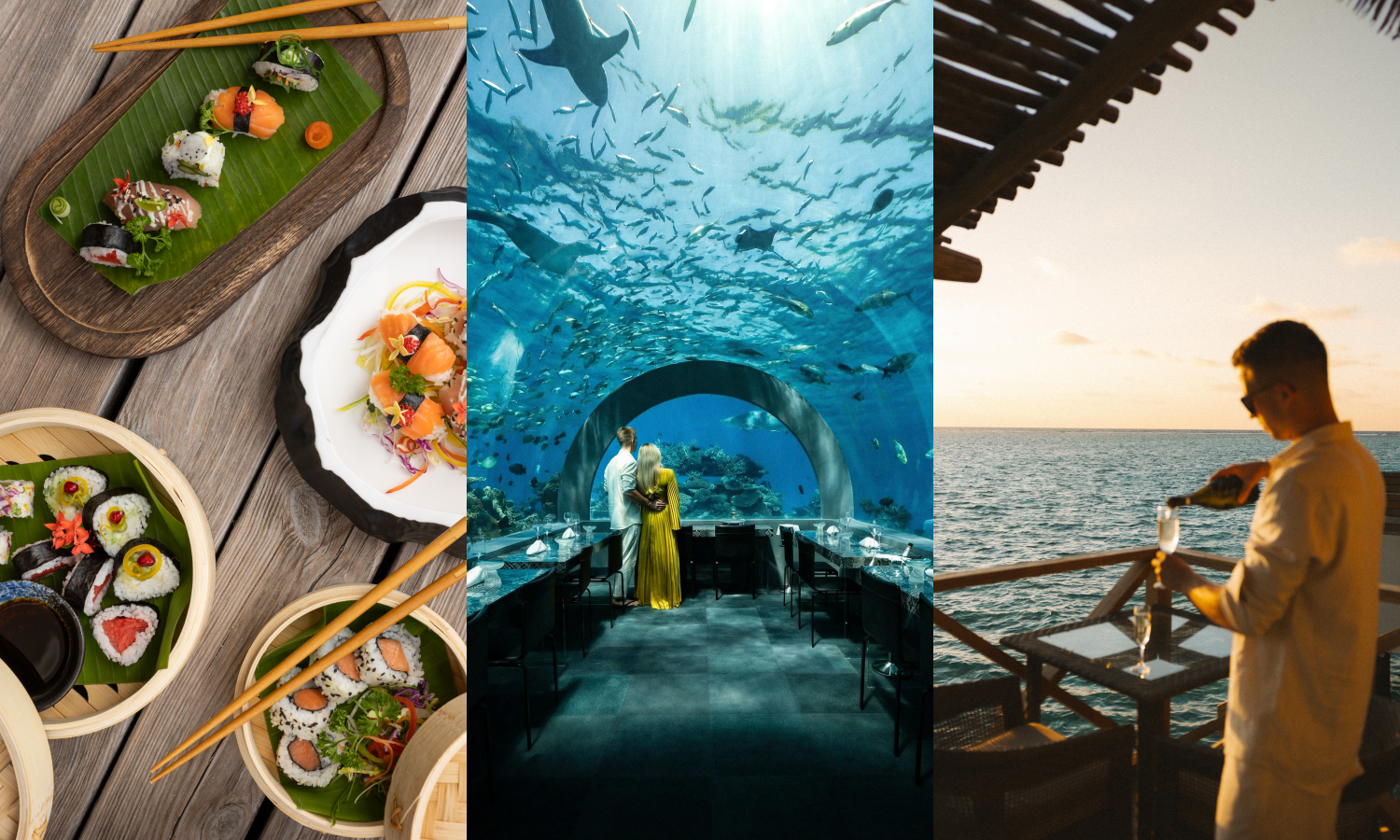
You & Me Maldives, the adults-only luxury retreat under The Cocoon Collection, has announced the launch of its new Premium All Inclusive experience, aimed at enhancing island stays through a more seamless and comprehensive offering in the Indian Ocean.
The Premium All Inclusive experience is designed to begin from the point of arrival. Guests receive complimentary access to The Cocoon Collection Lounge at the seaplane terminal at Velana International Airport, where services are provided to ensure a smooth transition before the journey to the resort.
On arrival at the island, guests are welcomed in their villas with a chilled bottle of sparkling wine and a selection of canapés. The Premium All Inclusive plan includes unlimited premium beverages by the glass, featuring a curated range of wines, signature cocktails, top-shelf spirits, international beers and non-alcoholic options. The in-villa minibar is replenished daily with soft drinks, international beers, red and white wines, as well as assorted snacks. For stays of five nights or more, guests also receive two bottles of premium liquor from a selected list, provided once during the stay.
The experience further includes a range of activities. Guests staying a minimum of three nights are offered one sunset cruise and one snorkelling excursion per stay, while those staying seven nights or more are entitled to a catamaran cruise. Unlimited use of snorkelling equipment and non-motorised water sports, including canoeing, kayaking and paddle boarding, is also included, subject to weather conditions.
Dining forms a central part of the Premium All Inclusive concept. Guests can enjoy three themed dining evenings, including a seafood barbecue under the stars featuring prawns, lobster and oysters. For stays of five nights or more, guests may also take part in a complimentary group cooking class, with a choice between ethnic or Italian cuisine, led by the resort’s culinary team.
Wellness offerings are also incorporated into the programme, with guests able to participate in up to three complimentary sunrise yoga sessions per stay, subject to availability.
The introduction of the Premium All Inclusive experience reflects the resort’s focus on personalised service and carefully curated stays. The offering is positioned to appeal to couples seeking relaxation, romance or activity-led experiences within an adults-only island setting.
Featured
Eid celebrations at SO/ Maldives blend Arabic tradition and Maldivian culture

SO/ Maldives is inviting global travellers this season to reimagine Eid not merely as a holiday, but as an immersive island escape. Located just 15 minutes by speedboat from Malé, the fashion-forward private island retreat sets the stage for a celebration where cultural heritage, contemporary luxury and tropical glamour come together.
At the centre of the festivities is an authentic culinary experience at Hadaba, the resort’s award-winning Arabic restaurant. Guests are offered Levantine flavours, artisanal mezze and traditional recipes presented with a modern approach, creating a setting for shared dining and celebration. As part of the resort’s dine-around concept, Hadaba can be included in a wider culinary journey across the island, allowing guests to experience Arabic cuisine alongside the resort’s other dining venues.
As evening falls, celebrations move to Lazuli Beach Club, where shisha rituals and Arabic-inspired refreshments are served in a beachfront setting. Traditional performances are complemented by Maldivian Boduberu drumming and fire dance displays, creating a cultural programme designed to appeal to international travellers seeking meaningful experiences.
Across the island, Eid is marked through a series of curated activities aimed at encouraging connection and creativity. Cultural workshops, including palm-leaf artistry and henna sessions, offer opportunities to explore heritage, while younger guests are engaged through themed crafts, interactive games and sweet treat decorating. The overall atmosphere remains celebratory while maintaining a relaxed pace that reflects the resort’s character.
Beyond the festive programme, the resort positions the long weekend as a fully immersive island retreat. Guests stay in beach and overwater villas featuring private pools and ocean views, with interiors inspired by high fashion. Time is spent between spa treatments, lagoon activities, beach club experiences and sunset dining, balancing celebration with seclusion.
To mark the season, the resort has introduced two limited-time stay offers. The One Night on Us offer provides savings of 33 per cent on stays of three nights or more, along with daily breakfast, complimentary transfers and spa privileges. The Soo Summer package offers preferential rates combined with spa experiences, curated dining inclusions and additional benefits for water villa stays.
Welcoming travellers from Europe, Asia, the Middle East and beyond, the resort presents Eid as a global celebration where Arabic traditions, Maldivian culture and contemporary design are brought together. This season, guests are invited to exchange routine for island surroundings and experience Eid through a redefined island perspective.
-
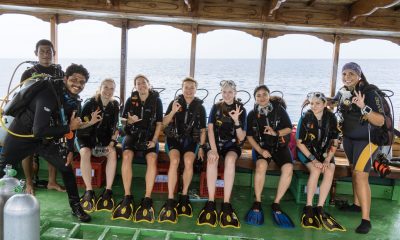
 Action1 week ago
Action1 week agoAtmosphere Foundation launches annual dive training scholarship for Maldivians
-
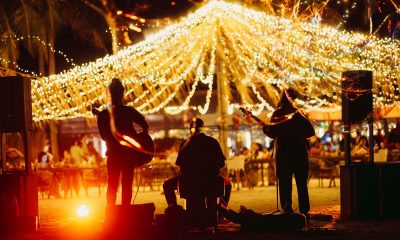
 Entertainment1 week ago
Entertainment1 week ago‘One festival, every sense’: Fari Islands Festival announces August 2026 return
-
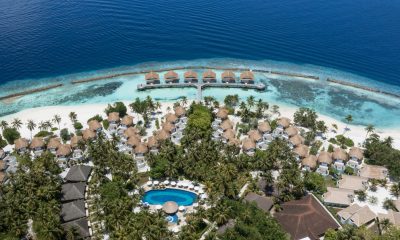
 Awards1 week ago
Awards1 week agoBandos Maldives earns Booking.com Traveller Review Award 2026
-
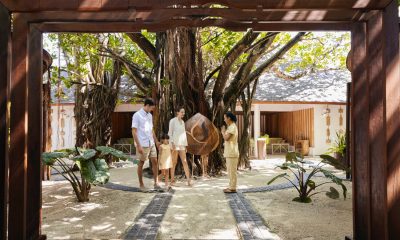
 Featured1 week ago
Featured1 week agoAncient banyan tree anchors spiritual experiences at Machchafushi Island Resort
-
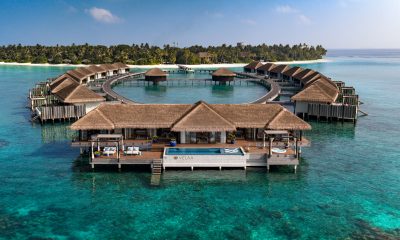
 News7 days ago
News7 days agoRefined overwater vision: Velaa Private Island’s upgraded Ocean Pool House
-
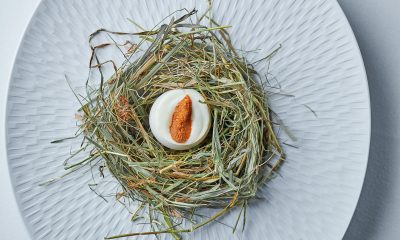
 Cooking6 days ago
Cooking6 days agoA spring of flavours: Nowruz dining series at JW Marriott Maldives Resort & Spa
-
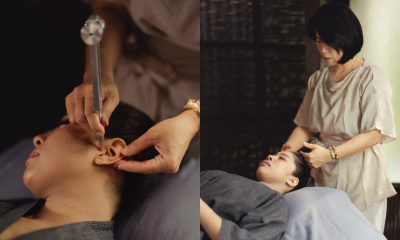
 Featured1 week ago
Featured1 week agoYoko Kawaguchi to lead holistic wellness residency at Vakkaru Maldives
-
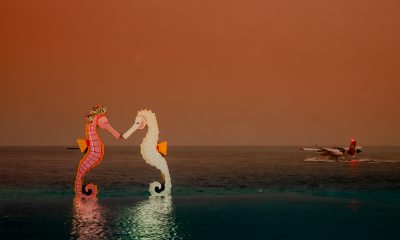
 Love1 week ago
Love1 week agoFushifaru Maldives combines romance and lunar new year traditions in guest programme



